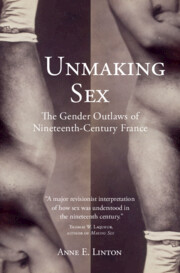Book contents
- Reviews
- Unmaking Sex
- Unmaking Sex
- Copyright page
- Contents
- Figures
- Acknowledgments
- Note on the Text
- Introduction Gender Revolution Before Intersex or Transgender
- Part I A Cultural Prehistory of Intersex from the Archives
- Part II Contextualizing High and Low Literary Narratives
- Chapter 3 Is She or Isn’t He?
- Chapter 4 Inheriting “Hermaphrodism”
- Epilogue The Nineteenth-Century Roots of Contemporary Resistance to “True Sex”
- Notes
- Works Cited
- Index
Chapter 4 - Inheriting “Hermaphrodism”
How Degeneration Theory Changed Literature and Medicine
from Part II - Contextualizing High and Low Literary Narratives
Published online by Cambridge University Press: 03 March 2022
- Reviews
- Unmaking Sex
- Unmaking Sex
- Copyright page
- Contents
- Figures
- Acknowledgments
- Note on the Text
- Introduction Gender Revolution Before Intersex or Transgender
- Part I A Cultural Prehistory of Intersex from the Archives
- Part II Contextualizing High and Low Literary Narratives
- Chapter 3 Is She or Isn’t He?
- Chapter 4 Inheriting “Hermaphrodism”
- Epilogue The Nineteenth-Century Roots of Contemporary Resistance to “True Sex”
- Notes
- Works Cited
- Index
Summary
Chapter four traces the nebulous narrative of degeneration theory in Zola’s La curée, (The Kill) from its origins in medicine to its influence in fiction, and then back to case studies of hermaphrodism. This trajectory reveals how the degeneration diagnosis fundamentally shifted doctor-patient relationships. The French fin-de-siècle natality crisis elevated the stakes of hermaphrodism and non-reproductive sexuality, illustrating how social anxiety can fundamentally alter scientific findings, and how science can, in turn, influence lived experience in fundamental ways. Zola’s obsession with androgyny is merely a partial reflection of what became widespread cultural terror inflected in the writings of numerous authors and doctors, from the well-known Rachilde and Huysmans to the more obscure Armand Dubarry and Dr. Laupts. In La curée, hermaphrodism becomes a scary confluence of scientific, moral, and social anxiety that prefigures its treatment in later nineteenth and early twentieth-century sexology. At the same time, however, Zola’s use of androgyny in La curée unexpectedly subverts his normalizing use of science. By portraying unstable gender identities, La curée undermines the seemingly inexorable calculus of degenerate heredity inherited from medicine and recasts literary naturalism in a new light—less as a derivative of science than as a critic of it.
Keywords
- Type
- Chapter
- Information
- Unmaking SexThe Gender Outlaws of Nineteenth-Century France, pp. 135 - 169Publisher: Cambridge University PressPrint publication year: 2022

